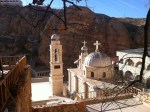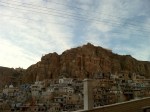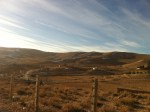
Over the years, first communions have become less about the religious value they uphold but rather about which child has the best combo of it all: souvenirs, party, ceremony.
It was the case when I did it almost 18 years ago. My parents went all out. Things have only gotten worse since.
Despite the materialistic aspect of the ceremony, it remains a rite of passage for a lot of Lebanese Christians, mostly Maronites. For many children, it’s the highlight of their 8th year. For most parents, it’s one of the last religious festivities their children will go through .
Yesterday, news surfaced that well-known Lebanese reporter Bassam Abou Zeid wouldn’t be going through that experience with his two little boys: Matheo and Iowan.
In a Facebook post, Abou Zeid detailed the ordeal his children were going through in the St. Doumit Parish in Zouk Mkayel; the ceremony organizers were having issues handling them so they required the parents to be present during rehearsals, which the parents obliged to, only to be faced with the ultimatum that their children were not a “proper fit” with that particular parish to undergo the ceremony.
When Abou Zeid spoke to the Parish priest to sort things out, parents threatened to take their children elsewhere if Abou Zeid’s children were to remain part of that particular first communion, for fear of them “ruining” it.
To summarize: this is one of the most disgusting things to occur in Lebanese society in years, there’s nothing Christian about this. Those parents – screw them – should be ashamed. Those ceremony organizers should be ashamed as well.
Let’s start with the ceremony organizers.
It is your duty as volunteers to hold such ceremonies to take in children from all kinds of kinds whose parents want them to take the next step in their Christian life. Bassam Abou Zeid’s children having special needs and you not being able to adapt to them does not reflect negatively on the children, it shows your ineptitude at doing your job. I don’t blame you. I blame the Parish that accepted you to run their ceremony to begin with.
To those parents who threatened to transfer their children if Bassam’s boys were allowed to participate, you are nauseating. Not only is this utterly disgusting on your part, it also shows that you are unfit parents, to condemn little boys in that manner, little boys whose only fault was to have special needs, which isn’t really a fault at all. I hope that your children never face the kind of discrimination you’re throwing at Matheo and Iowan. I hope you never have to be the parent in Bassam’s shoes, and have someone like you tell them: oh, we don’t want your children to ruin it for ours. The only thing Christian about you is the sectarian tag on your ID. I advise you to take your children out of the ceremony anyway, there’s nothing Christian about what you are doing there.
To the priest Joseph Eid, it is your duty to make sure that Matheo and Iowan attend that ceremony along with the other children. It is despicable and horrifying if you were to succumb to the parents’ threats about not wanting their children to have their ceremony ruined. It is your job as a priest to make sure that the God you serve, the one who wanted all God’s children to be part of His church, not to have some children be excluded because their parents are dimwits or because your Parish is inept: “Let the little children come to me, and do not hinder them, for the kingdom of heaven belongs to such as these.” Mathew 19:14.
To Lebanon’s Maronite Patriarch, there are things more important in Christianity than the number of parliamentary seats Maronites get, what the president can do or who he is. The life matters of your people are important too. This is not an event worth letting by.
I don’t know what kind of special needs Bassam Abou Zeid’s children have, but it doesn’t matter. They’re just kids, and they’re falling victim not only to a religious institution, but to people who have no ounce of humanity in them. Tfeh.











